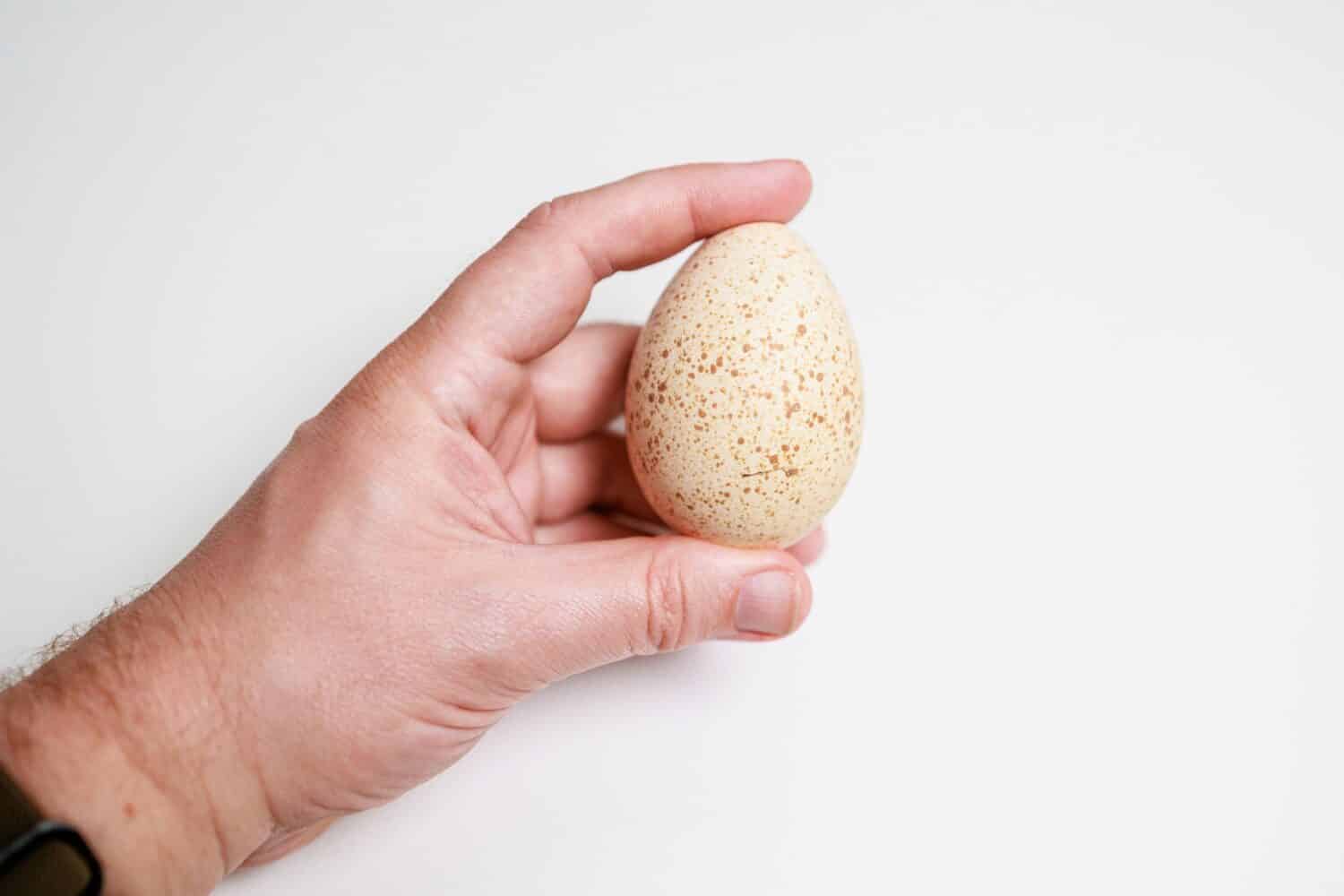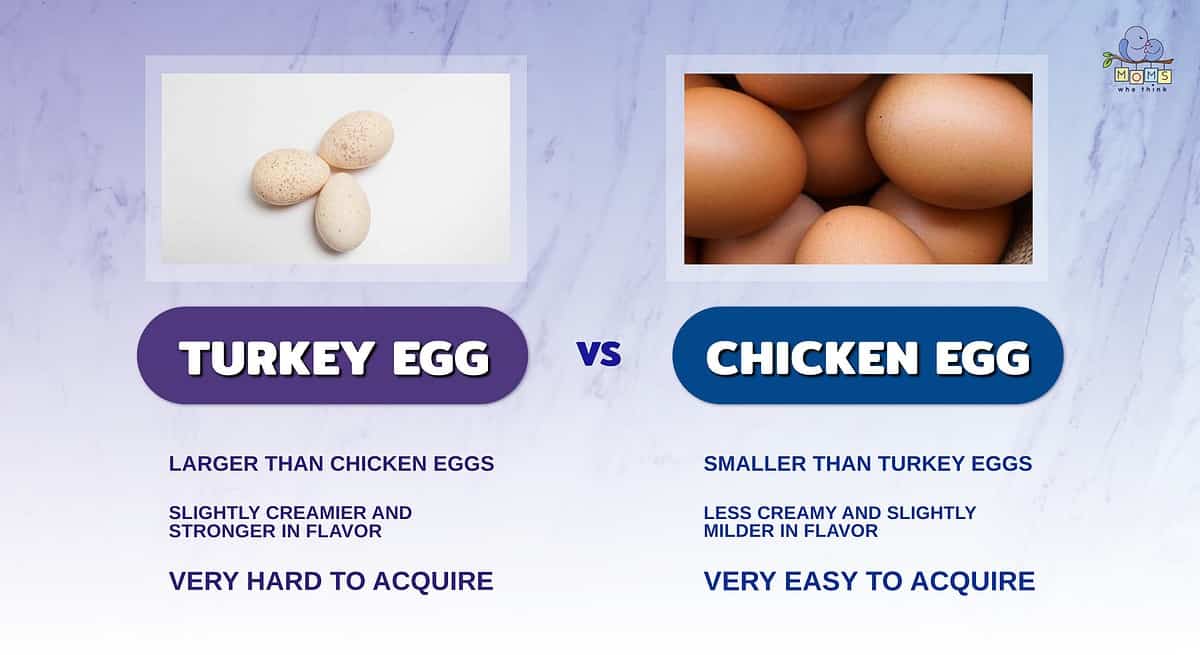As you plan your next breakfast meal, chances are, you're thinking about eggs – chicken eggs to be exact. After all, chicken eggs are the most available option when shopping at a local grocery store. But have you ever considered trying something different, like turkey eggs, with your next meal?
Before deciding which kind of egg to use in your next recipe, it's important to understand the differences between turkey eggs and chicken eggs. While they differ in size, availability, and even taste and texture, it's the shell itself that truly sets these two types of eggs apart. Turkey eggs tend to have a thicker shell and membrane that separates the egg from the shell. This can make them harder to crack than chicken eggs.
In today's post, we'll take an in-depth look at what sets these two eggs apart. Whether you're simply curious about turkey eggs or you're looking for a new option at your next family breakfast, let's dive into the differences between turkey eggs and chicken eggs.
Turkey Eggs vs. Chicken Eggs: What are the Differences?

©Graeme J Baty/Shutterstock.com
As mentioned, these two types of eggs have varying thicknesses of their shells. Turkey eggs also tend to be larger than chicken eggs and are less accessible due to their low supply. Let's take a closer look at what else sets these two types of eggs apart.
Size
The size of both eggs is one of the biggest factors that sets them apart. Turkey eggs tend to be much larger than chicken eggs, coming in at almost 50% larger. The average chicken egg is about 2 inches in length and 1.5 inches in diameter whereas a turkey egg is about 2.55 inches in length and 1.7 inches in diameter. Additionally, one turkey egg is about 79 grams while one large chicken egg is only about 50 grams.
Taste and Appearance
Generally speaking, both eggs taste fairly similar. Turkey eggs, however, can be a little creamier (due to their larger size and higher fat content) and some argue that they have a slightly stronger flavor.
As mentioned, turkey eggs have a thicker membrane and shell. This means that turkey eggs are more difficult to crack. Turkey eggs and chicken eggs also have different colored shells. Chicken eggs can be in a wide variety of colors. You've probably seen white, brown, or even blue when purchasing farm fresh eggs. Turkey eggs, however, are generally all the same: White or cream-colored with brown speckled spots. They are not typically a solid color like chicken eggs are.
It's also important to note that the larger the size of a turkey egg means that it has a higher yolk-to-white ratio. This can affect cooking times and recipe measurements.
Availability
When grocery shopping, you'll rarely find turkey eggs available for purchase at the store. The reasons are two-fold.
First, turkeys lay far fewer eggs per year than chickens. In general, chickens can lay up to 300 eggs per year, sometimes more depending on the breed. Turkeys, on the other hand, only lay at most about 100 eggs per year. A turkey may only lay 2 eggs per week, whereas a top-laying chicken can lay about one egg a day. Due to sheer numbers, turkey eggs can be more challenging to find and purchase.
Second, turkeys are known and typically raised for their meat, not their eggs. A turkey does not start laying eggs until 28 weeks of age (a chicken needs only 20), but their meat is mature at 14-18 weeks. This means that in order to raise a laying turkey, you'd need to add in the cost of feed to raise it until it's of age to start producing eggs.
When looking to purchase turkey eggs, try your local farmer's market. Or, you may be able to track down some eggs by contacting local farmers who raise heritage turkeys and seeing if they have any eggs available for sale.
Cost
As discussed, turkey eggs are far less available than chicken eggs. Due to the low supply of turkey eggs and less demand for them, their price is much higher than chicken eggs. Chicken eggs, on the other hand, are widely available and in large supply, making them more affordable.
It's important to note that the exact price difference can vary depending on your location and the specific market you're purchasing from. Try checking with local farmers or visiting your farmers market to discover more about the price difference and availability of each egg.
Turkey Eggs vs. Chicken Eggs: Nutritional Value
When it comes to nutrition, both types of eggs are known for being good sources of vitamins, minerals, and protein. However, turkey eggs contain slightly higher levels of protein due to their larger size. Turkey eggs are also an excellent source of B vitamins, including vitamins B9 and B12 (folate). Additionally, they are rich in iron and Vitamin A.
Keep in mind that both eggs can be part of a healthy, balanced diet.
Let's compare a breakdown of each. According to the USDA's FoodData resource page, one turkey egg contains:
- 135 calories
- 10.8 grams of protein
- 9.4 grams of fat
- 737 milligrams of cholesterol
The same resource page from the USDA shows that one large chicken egg contains:
- 71.5 calories
- 6.3 grams of protein
- 4.76 grams of fat
- 186 milligrams of cholesterol
As you can see, turkey eggs are slightly higher on all of these numbers, but this is largely due to their increased size. This is especially important to note as we compare each egg's cholesterol amount where turkey eggs are significantly higher in value. Keep in mind, however, that research from the National Library of Medicine states that cholesterol from eggs doesn't increase the risk for cardiovascular disease.
Can You Substitute Turkey Eggs for Chicken Eggs?

©Graeme J Baty/Shutterstock.com
Looking to swap out your usual chicken eggs for the deliciousness of turkey eggs? Good news! These two eggs can be easily substituted with each other in most recipes.
However, there are two things to keep in mind:
One, the size difference in these eggs can affect your recipe. You may need a smaller quantity of turkey eggs when replacing them with chicken eggs. As a general guideline, one turkey egg can be substituted for two to three chicken eggs. The larger size may also affect your cooking time. When making omelets, quiches, or frittatas, you may need to extend the cooking time to ensure the eggs are fully set and cooked through.
Two, it can be challenging to find turkey eggs due to their decreased availability. While you might be looking to change things up in the kitchen by using turkey eggs instead of chicken eggs, you may have a hard time tracking them down.
Egg Recipes
Print
Potatoes and Chicken Eggs
Ingredients
3 Tablespoons vegetable oil
3 cup frozen loose-pack diced hash brown potatoes with onion and peppers
6 eggs
1/4 teaspoon salt
1 cup shredded cheddar cheese
1 cup salsa
Instructions
1. Heat oil in a 12-inch skillet over medium-high heat.
2. Carefully add hash browns to form an even layer. Cover and cook for 7 to 11 minutes, turning every 2 to 3 minutes.
3. Meanwhile, in a small mixing bowl, beat together eggs and salt.
4. Add mixture to potatoes. Cook, uncovered, for 1 to 3 minutes or until almost set, pushing cooked egg to center after 1 minute, then every 15 seconds.
5. Top with cheese; let stand for 1 minute or until cheese melts.
6. Serve with salsa.
- Scrambled Egg Breakfast Bake
- Bacon and Cheese Quiche
- Ham, Brie, and Tomato Frittata
- Busy-Night Breakfast Bake
Final Thoughts

- Turkey eggs are about 50% larger than chicken eggs. This makes sense, considering that turkeys are much larger birds than chickens.
- While most people feel that turkey and chicken eggs taste very similar, some claim that turkey eggs are slightly creamier and stronger in flavor.
- Since turkeys are not ideal egg-layers, many farms with turkeys do not produce turkey eggs. This makes them much harder to acquire than chicken eggs.
The next time you shop for eggs, consider how turkey eggs can benefit your recipe. Their larger size, richness, and colorful shell can offer a unique alternative to regular chicken eggs. The drawbacks of using turkey eggs, however, are that they tend to be more challenging to find and may cost more due to their low supply and demand. But both turkey and chicken eggs can be a healthy choice and part of a balanced diet. So, next time you're planning your breakfast menu, consider venturing beyond the norm to give turkey eggs a chance. Bon appétit!
The image featured at the top of this post is ©New Africa/Shutterstock.com.


